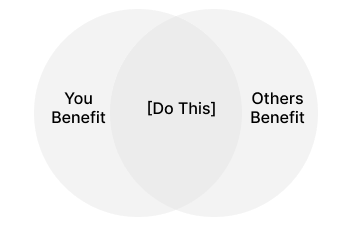Lessons From 2023
It feels like 2023 was a tough year for many. Speaking to colleagues, people feel like they never recovered from the 2020 pandemic. This year had a later spring, a drier summer, a shorter autumn, and we’re looking at a colder winter. For me personally, I believe I learned a few powerful lessons that are worth saving for future self.
I took the time to transform each section into a CBT-style (Cognitive Behavioral Therapy) exercise.
I. Be a stakeholder in everything you do

What happened
I wrote a script for my local church that crawled the wayback machine for some hundreds of WordPress articles lost due to a hacker attack, only to be stood up by the guy as I waited 2 hours under the snow. I spent 2 weeks writing a plugin for an open-source launcher, which got promptly merged and completely rewritten by the maintainer soon after. I rebuilt our apartment’s whole kitchen from the ground up, only for my wife to pinpoint every single imperfection she could find. I worked extremely hard on some complicated problems for my company, which did get noticed, and there were talks of a promotion, except it never came.
Takeaway
We always work for reward; it’s in our brain. When we expect to receive something but don’t, we feel bad. Reward comes in many forms, be it a bonus, a promotion, or even some display of appreciation. On many occasions this year, I felt this emotion of not receiving the reward signal I expected.
In all of these scenarios, the problem was not that I was not rewarded as I expected. The problem is that I told myself I was doing them for someone else. I was motivated by values of sacrifice and charity. And when I was ghosted, it hurt.
I was telling myself a lie, though: in everything we do, we have to find how we’re also doing it for ourselves. We might make it clear from the get-go. When you’re a beneficiary of what you do, there’s no reason to expect anything in return. And if you can’t figure out how you could possibly benefit from something you’re about to do, you might be better off not doing it.
As the saying goes:
Quote
Chop your own wood, and it will warm you twice
Exercise
List the top 3 things keeping you busy, and reflect on how you are impacted by them.
| What’s the task at hand | How much effort am I putting into it | How am I benefitting from this | Who else am I working for | |
|---|---|---|---|---|
| Example | Replace the 20-year-old (now illegal) gas stove | Purchase the new electric one, get rid of the old one, hire an electrician to add the new wiring, assemble/connect new oven | With the approval from the city, we’ll pass the safety check, and be able to sell the apartment | My wife, the town’s administration |
| 1 | ||||
| 2 | ||||
| 3 |
II. Broadcast your progress, channel your problems

One of my pet peeves in the software industry is when teams don’t give enough attention to bugs. This is particularly annoying to me because I try really hard to address all the problems, even if I say I won’t fix them. I usually find little success reporting things in service desks, slack/discord channels, team meetings, and so on.
On the other hand, when I report things privately to people, I usually get a good response rate. I think this is because, privately, we can afford to be more polite and more precise about what we need. I also think there’s some social dynamics at play, and people probably don’t want to jeopardize interpersonal work relationships by ignoring others.
I find it helpful to do my research before reporting things, bring as much data as possible, and make the case for the benefits of fixing the problem at hand. Finally, I always make sure to show people how a product is working better after their fix and show my appreciation for their work.
Again, we can transform this into a personal exercise. List the top 3 things you need from people, and reflect on how you have communicated them.
| What work I need done | Who is the one person who could help me | How would they benefit from doing this | What’s the best way to reach them privately | |
|---|---|---|---|---|
| Example | Upgrade cluster to the latest version | The devops guy | The whole company gets to deploy new tools, and enjoy the newest features and higher security | DM on slack |
| 1 | ||||
| 2 | ||||
| 3 |
III. We have more ownership of our problems than we think

I recently learned about the term problem drinker, which I found funny because I thought he was referring to drinking your problems away (it means something entirely different though). The fact is, I’ve been trying to avoid all sorts of bad behaviors, often successfully, but I was doing it the wrong way.
I started to avoid situations that could lead to me doing something I didn’t want, and ended up neglecting friends. I even lost one of my best friends; he claimed our friendship became one-sided. You can see that this is not a healthy approach to improving.
Instead, the ideal path is to take control of one’s self and learn to minimize or avoid the behavior, not the environment. I honestly believe this is true for positive change too. Instead of putting ourselves in a healthier environment (say, a gym or a healthy-food restaurant), we must take note of our own behaviors (sleep late, lay on the couch all day).
| Behavior to start/stop | Consequences of failing | Current contributing behaviors | What would the improved behavior look like | |
|---|---|---|---|---|
| Example | Excessive Drinking | Upset partner, waste of money, health issues | Drinking fast, unable to say no, use alcohol as temporary relief, alcohool as social fuel | Still hang out, choose weaker drinks, drink slower, spend less money, get home earlier, less hangover |
| 1 | ||||
| 2 | ||||
| 3 |
IV. Final Notes
All in all, I keep coming back to this thought of holding oneself to a higher standard. I think it’s a good way to live, and I hope you find it useful too.